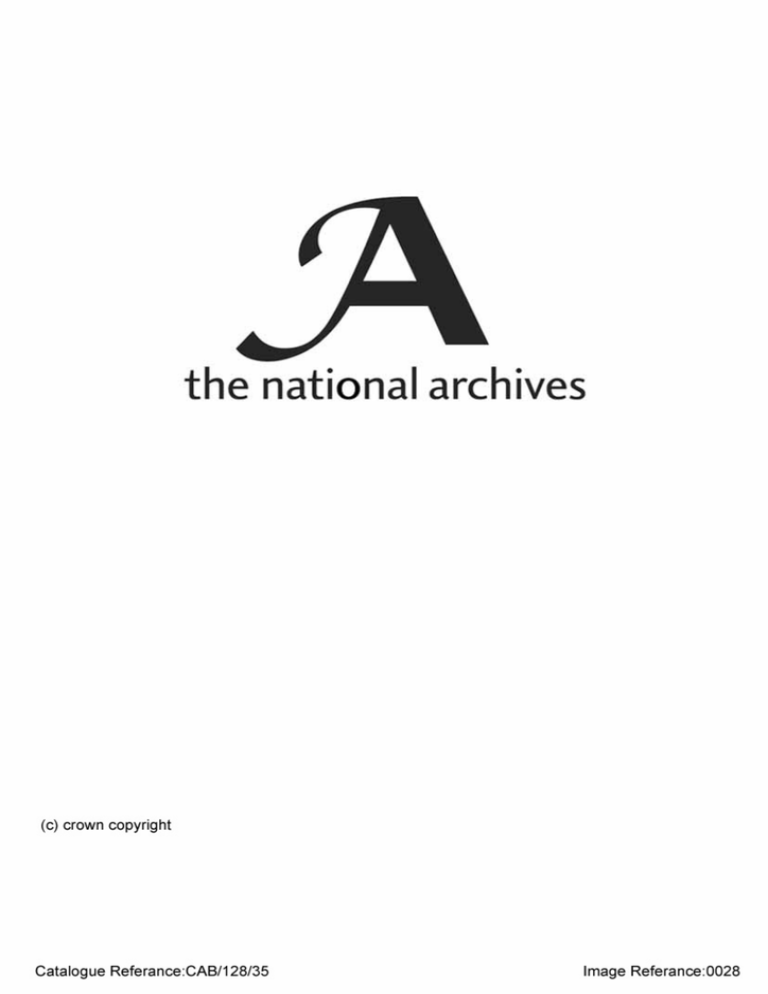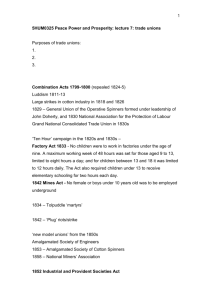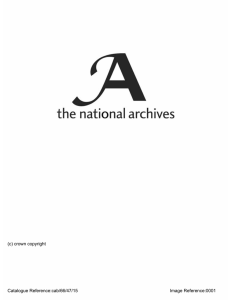Document 11227216
advertisement

IS In discussion it was recognised that it would be almost impossible to reconcile a concession of more than about 14 per cent, in England and Wales with the Government's decision, which had attracted considerable public support, to offer only 12i per cent, in Scotland. The only alternative, however, was for the Government to take responsibility for the damaging consequences either of a breakdown in the negotiations or of rejecting an agreed recommendation. At least at the.present stage it would be unwise to alienate the authorities by indicating in advance that the Minister would not approve a recommendation for a greater increase. If, however, they failed to agree among themselves or made an offer which was rejected by the teachers, it might be possible to make some progress towards resolving the situation by calling the two sides of the Burnham Committee together to meet the Minister. The present dilemma illustrated the unsatisfactory nature of the negotiating machinery. Similar embarrassments must be expected to recur unless in the future the negotiations and settlements in England and Wales and in Scotland could be synchronised. It was also for consideration whether the Education Act, 1944, should not be amended so as to empower the Minister, like the Secretary of State, to modify agreed recommendations. In addition, it was most desirable that the whole salary structure for teachers in England and Wales should be reorganised so as to dispense with the single basic scale upon which it had for some years been founded. Summing up the discussion the Prime Minister said that in the dilemma with which the Government were faced the best course seemed to be to await the outcome of the local authorities' meeting on 29th May. Meanwhile it would be as well to give further consideration to the possibilities of reorganising the negotiating machinery and to warning the local authorities that, if the Burnham Committee submitted an agreed recommendation which the Government could not approve, the future of the existing machinery might be called in question. The Cabinet— (I) Invited the Minister of Education to inform them immediately of the outcome of the meeting on 29th May of the local authorities' side of the Burnham Committee. (2) Invited the Secretary of State for Scotland and the Minister of Education, in consultation with the Chancellor of the Exchequer, to put before them in due course proposals for reorganising the machinery for negotiating teachers' salaries. Industrial Disputes (Previous Reference: C C . (61) 26th Conclusions, Minute 6) 4. The Cabinet had before them a memorandum by the Minister of Labour (C. (61) 64) about current problems of industrial relations. The Minister of Labour said that the major problem of industrial relations in recent years was the prevalence of unofficial strikes, frequently arising out of petty grievances, particularly in four industries-coal mining, shipbuilding and repairing, motor manufacturing and the docks. There was little scope for the Ministry of Labour to exercise its conciliatory functions openly in unofficial disputes. Legislation against strikes would be undesirable, since it would be strongly opposed by the trades unions and would do serious damage to industrial relations generally. Moreover there would be great practical difficulties of definition and enforcement. The best approach was to seek to strengthen the authority of the responsible elements in the trade union movement, and to encourage better industrial relations at all levels, by improved management and greater co-operation from labour, especially in the strike-prone industries. This policy w a s already achieving encouraging results. Following discussions with the motor industry* there were indications that the unions were prepared to exercise their authority in unofficial strikes. In shipbuilding the recommendations of the Shipbuilding Advisory Councils Sub-Committee on Prospects should be pursued, and the Employers' Federation were at present working out proposals for securing improved relations in the industry. As regards the docks, the employers would shortly formulate a plan to provide greater continuity of employment, which would facilitate better relations; and steps were being taken to improve the organisation and the quality of the officials of the unions concerned. In coal mining, it would be appropriate to seek the views of the new chairman of the National Coal Board on industrial relations in the industry. When the result of the current law suit against officials of the Electrical Trades Union became known, it would be necessary to consider whether any further steps could be taken to deal with abuses of trades union procedures. His inclination was to avoid legislation, since this would be resented by trade unionists generally, and to use the case primarily to expose Communist influences in the movement. In discussion the following points were m a d e : (a) The Commonwealth Secretary said that he was not convinced that there were insuperable practical difficulties in amending trade union law so as to remove some of the existing protections given t o workers and unions. For instance, it might be made possible for union funds to be attached if damage could be proved as a result of a strike, whether official or unofficial, if it were supported by the union, in breach of a labour agreement. In reply, it was pointed out that the result of legislation on these lines would be to make all strikes unofficial. Unofficial strikes were in most cases not supported by the union, and rarely arose from the breach of any specific agreement. To render unions' funds liable to attachment would be unfair to responsible elements in the unions and would undoubtedly provoke deep resentment. (b) The possibility of legislation to improve the supervision of trade union affairs ought not to be ruled out. The Electrical Trades Union case might show that the existing powers to deal with abuses were sufficient, and it might be decided to bring criminal proceedings. The case would provide an opportunity to consider whether the existing powers of the Registrar of Friendly Societies to intervene in trade union affairs should be strengthened. (c) There was great variation, not only between industries but between firms in the same industry, in the attention given to the management of labour. Management study ought to be an important subject in technical and university education in this country, as it already was abroad. The efforts of the British Institute of Management in this field should be encouraged. (cl) The problem of industrial relations was inseparable from that of restrictive practices in the labour field. The multiplicity of unions was a particularly serious disadvantage. Consideration should be given to the possibility of devising some means of exposing restrictive labour practices. It would probably be undesirable, on human grounds, for these to be made subject to judicial decision, as were commercial agreements in the Restrictive Practices Court, but they might be made the subject of enquiry by an administrative body analogous to the Monopolies Commission. The Cabinet— (1) Invited the Minister of Labour to circulate a memorandum about"the implications of the Electrical Trades Union law suit, when judgment had been given in that case.





